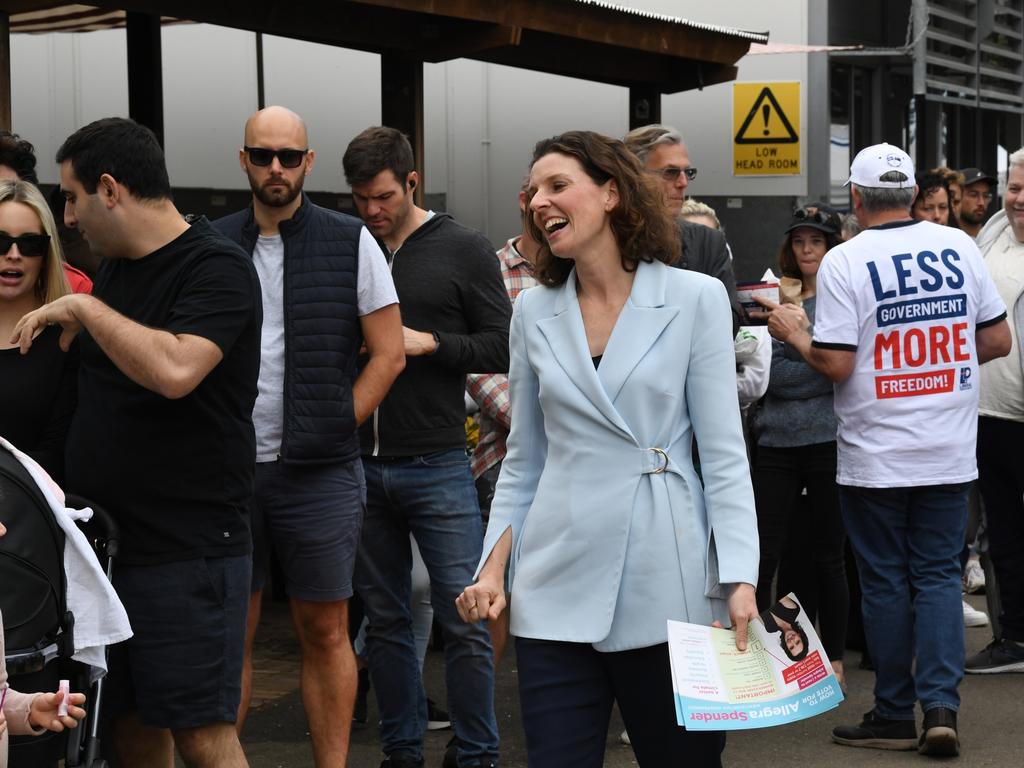Identity politics must be met with full force of a bulldozer
The nation is in a vulnerable place, with huge challenges, yet many want to pretend otherwise.

The Coalition government and Scott Morrison’s leadership have been far from perfect but none of the most rational criticisms against them (profligate spending, failure to bring the states to heel over lockdowns and border closures, and being timid on the culture wars waging around our institutions) have figured prominently in the national debate.
Instead, it has been a Twitter-level campaign of character assassination, climate fearmongering and corruption smearing.
Either voters will see through this and return the government (and while filing this column long before the final polling has been revealed, this outcome still strikes me as highly plausible) or we have to consider that our political debate has devolved to a new superficiality. The polls have been messy and the media narrative overly simplistic, so that the outcome hinges on hand-to-hand combat in crucial marginal seats where preference flows from myriad minor parties and independents will decide the outcome.

What passes for our public square is increasingly toxic, so that conservative views are derided and right-of-centre advocates demonised. This is probably exacerbating the shy-Tory factor, where the privacy of the voting booth allows much freer right-of-centre expression than a show of hands at the pub.
Besides, it has always been my view that, en masse, Australian voters tend to be eminently sensible. If we do install Labor this time, my underlying assumptions about the way our democracy functions will have to change – especially if it is a kaleidoscope coalition of red, green and teal, a government by Labor, Greens and fake independents. Think about the arguments put by the opposition parties, the campaign performance of Anthony Albanese and the huge dilemmas facing this country. If you assess those factors with at least as much attention as you would give a $10 each-way bet at Flemington, you would have to stick with the devil you know. It is a government, after all, that has weathered drought, fire, flood and pandemic, yet it has seen the nation emerge largely intact, with the lowest unemployment in almost 50 years, and some sort of a plan to grow the economy out of its debt trap. Along the way it has kept our borders secure, stood up to China and made a momentous decision to scale up our military capabilities and partnerships.
China wants to see an Australia that is economically enfeebled, militarily meek and less assured on the global stage in concert with its allies. No one wants to say it so bluntly, but clearly in pursuit of those objectives Beijing would like to see a change of government.
To be clear, if Albanese becomes prime minister he will only have my best wishes to stick by his word on border security, national security and economic responsibility. Labor’s stated aims in these areas are commendable, it is just that its past positions and performance invite doubt.
We cannot go down the US path of questioning democratic outcomes. As John Howard said on The Kenny Report during the campaign, at least we will have a fair and open contest and then accept the democratic outcome.
My point, and deepening concern, is about the public debate, broader education and political practices that inform our choices. We seem to have ushered out the Age of Reason in favour of another dawning of the age of Aquarius.
People are being told they can vote for a better climate, the end of discrimination and crimes against women, and the eradication of partisan decision-making. None of this stands up to scrutiny, all of it is driven by shallow, social media instincts. If people are swayed by this stuff, then hats off to the political tacticians, but it would be time to worry about the decision-making of voters in the digital age.
Again, my inclination is to expect a result that will confound the accepted wisdom, but as we await the verdict, we must rationalise the alternative. It seems to me that the trend we are observing has its roots in identity politics, an insidious force across the Western world. And it reflects the post-material concerns that dominate the thinking of people in the affluent areas of our cities, dividing them ever more sharply from the practical and material focus of the mainstream.
Think of the teal independent voters in the wealthy suburbs of Sydney’s Wentworth and North Sydney, or Melbourne’s Kooyong and Goldstein. Some will be committed Labor and Greens voters going along with this ruse as their own parties run dead because they see the potency of the fake independents.

But others will be former Liberal voters who have enjoyed the financial rewards of good economic management and strong national security stewardship but do not have the stomach for the hard-headed decisions behind them. They do not want to defend offshore processing, coal-seam gas or work-for-the-dole at dinner parties. Instead, they seek the warm embrace of the sanctimonious left that comes from demanding “compassion” on borders or backing more action to save the planet. These “compassionistas” gravitate to the Greens or the ALP’s Socialist Left in Labor electorates, but in these wealthy suburbs most people eschew any links to unionism or the mad socialism of the Greens – so they have been presented with the teal option.
It is a clever and cynical political ploy. These well-funded and highly organised so-called independents run with the implicit backing of Labor and the Greens and the explicit support of the green left or Love Media, hoovering up all of the left-of-centre votes and luring Liberal defectors.
By donning a teal T-shirt, people can identify as caring and nonpartisan, committed to fashionable causes and doing nice things – like sticking a rainbow on your social media profile. They join a kind of cult of community concern and win only praise from the ABC and Nine Media newspapers.
They get to identify with a movement that says politics is beneath them, suggesting they have higher ambitions than the mere pursuit of economic progress and sovereign rights. The movement reeks of post-material, moral superiority. The irony – lost on them – is that they demean and undermine the process.
These groups are run by seasoned political activists who have been involved in the aggressive campaign tactics of Get Up and the Greens. They are funded largely by millionaire men and advised by middle-aged men who choose to install middle-class, middle-aged women as their candidates of choice. They promise to improve the climate when scientific fact and economic reality clearly demonstrate they can do no such thing. The fake independents’ claims on climate are as nutty as Clive Palmer’s insistence that Craig Kelly will be the next prime minister.

On integrity, the teals ignore the Coalition’s willingness to establish a commission; the real debate is only about the model. The fake independents preach integrity while refusing to be honest about their intention to unseat a Coalition government or how they function as a disciplined political movement.
The Coalition is culpable, to be sure. It has abandoned a rational position on energy and climate in the hope of neutralising a political problem; failed to tackle the ideological zealotry of the public broadcasters, allowing the public debate to be skewed horribly green left; and chosen not to tackle the politically correct orthodoxy that taints our education system from preschool to postdoctoral.
Still, given they have a reasonable record and a comparatively sensible approach to the major challenges confronting the country, the critique against them is puerile. According to Labor, Morrison should lose the prime ministership because he once noted he did not “hold a hose” and other times shared the view that certain actions were “not his job”. Really?
Compared to this we have witnessed an inconceivably unconvincing campaign from Albanese. He did not know the cash rate or unemployment rate, he forgot his own six-point plan on the National Disability Insurance Scheme along with key aspects of his border protection policy, he was all at sea over the government’s successful boat turnback policy, and did not seem to realise our borders are now open.
Albanese wants climate action to be his legacy, and despite promising at the start of the campaign never to run from media conferences, he was cutting questions short within days. By the final week he was scampering away from pursuing journalists, leaving his host, Labor Premier Mark McGowan, like a shag on a rock. It was, in a word, unprime-ministerial.
On top of this we learned Labor’s deputy leader, Richard Marles, has been holding secret meetings with Chinese officials. And when Labor released its election costings it somehow had the audacity to criticise wasteful Coalition spending while promising to spend at least $8.4bn more.
As a nation we are in a vulnerable place, economically, strategically and culturally. Whoever governs us will need to do better, and the tenor and substance of our national debate must improve.
Yet large elements of society want to pretend that our greatest challenge is to somehow save the planet by fiddling with our 1.2 per cent (and shrinking) share of global emissions. They also argue that the way to fix our politics is to establish a particular model of integrity commission, even though the states have set up a series of imperfect anti-corruption bodies.
Our real threats and remedies are more prosaic, practical and pressing. Dare I say it, they require the diesel certitude of a Caterpillar D9, and they will not be easy.








The absence of reason in this election campaign is disturbing. If there is a change of government based on the arguments put forward by the opposition parties, then it will confirm our body politic has moved far beyond rational debate and landed in a place of memes, gestures and deceptive emotional posturing.